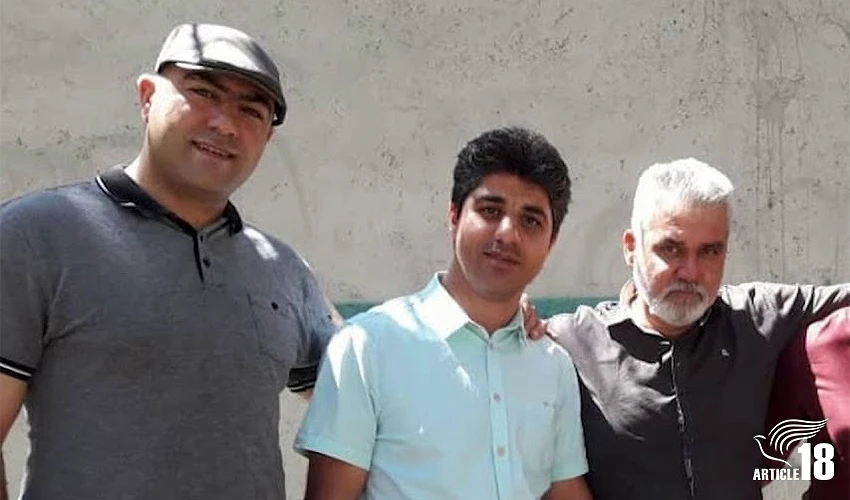Iran: Christian converts targeted under draconian law
Three years after Iran expanded an article of its criminal code relating to anti-state propaganda, fears it would lead to a further clampdown on religious minorities appear to have been justified. Converts to Christianity are among those who have been targeted under the legislation.

Milad Goodarzi, Amin Khaki, and Alireza Nourmohammadi (left to right) are the first known converts to have been convicted under the legal amendments. Art.18
More than a dozen Christian converts have been convicted in Iran under an article of the criminal code dealing with anti-state propaganda that was controversially amended in March 2021. One of the first to be sentenced under revised Article 500 has now been charged with violating it for a second time.
In a resolution passed in November 2023 the United Nations General Assembly said Christians and “particularly converts from Islam” faced increased harassment, intimidation, persecution, arbitrary arrest and detention in Iran.
It also stated that amendments to Article 500 and to Article 499 (membership of groups threatening state security) had “significantly escalated” discrimination, violence and other human rights violations against members of recognized and unrecognized religious minorities. (Only Zoroastrians, Jews and Christians count as recognized minorities in Iran, a Shi’a Muslim theocracy. One of the largest non-Muslim groups in Iran, the Baha’is, are unrecognized.)
Religious freedom under attack
Article 500 of the penal code of the Islamic Republic of Iran criminalizes “engaging in any type of propaganda against the Islamic Republic of Iran or in support of opposition groups and associations.”
Since it was amended, it also covers “any deviant educational or proselytizing activity contrary to the holy religion of Islam.”
Human rights observers said at the time of the legal revision that it constituted “a full-on attack on the right to freedom of religion and belief”. They warned that it would “disproportionately impact individuals belonging to religious and faith-based minorities and ethnic groups.”
Article 18, a non-governmental organization that promotes religious freedom in Iran, says the amendments to Articles 499 and 500 “have added further vagueness to an already vague set of laws.”
“They allow judges even greater leeway as they seek to impose the harshest sentences upon individuals who hold and share different opinions to the Islamic Republic, such as those who convert to a faith other than Islam,” commented Steve Dew-Jones, News Director at Article 18.
Christian converts from Islam are numerically the largest Christian community in Iran, but they are not recognized by the state. As a result they have no official place of worship and tend to meet in people’s homes – gatherings which the authorities deem illegal.
Convictions and sentencing
According to Article 18, since the revisions came into force on March 5, 2021, courts in Iran have sentenced at least 14 Christian converts under Article 500.
Those convicted under the legal provision face up to five years in jail – or ten years if collaboration with “foreign” entities is established – and the loss of basic rights, such as voting, for up to 15 years.
They include Ayoob Poor-Rezazadeh, Ahmad Sarparast and Morteza Mashoodkari. The three men received five-year prison terms in April 2022 for “engaging in propaganda and spreading deviant beliefs contrary to the holy Sharia.” All were released from prison early, in October and November 2023. But they are not free. They are serving the remainder of their terms outside prison, and must report back daily to work at a factory adjacent to the prison.
The authorities have also used the amended article against non-converts. Anooshavan Avedian, an Iranian-Armenian Christian was sentenced in April 2022 to ten years in prison for “propaganda contrary to and disturbing to the holy religion of Islam.” Police detained him at his home in Teheran, where around 18 Christians, including members of his family, had gathered to pray and worship.
House church members face trial
Others await trial. They include brothers Alireza and Amir Nourmohammadi. The Christian converts and house church members were arrested in Karaj, near Teheran, on December 11, 2023, and charged with “deviant educational or propaganda activities contrary to the holy Islamic law by making false claims in religious fields.”
It is the second time that Alireza Nourmohammadi is facing charges under the revised law. He and two other converts, Amin Khaki and Milad Goodarzi, were the first known cases of Christians charged under the amended legislation. In March last year he was released from Karaj central prison after serving 16 months.
New trends
According to the 2024 annual report issued by Article 18 and three other human rights organizations Iranian courts convicted and sentenced a total of 22 Christians in 2023. The report notes that besides Articles 499 and 500, Christians are also commonly charged under Article 498, which criminalizes the organization of groups hostile to the regime, of which house churches are considered an example.
In 2023 Article 18 observed an increased targeting of those distributing the Bible, with over one-third of arrests relating to the possession of multiple copies of the Bible.
“We are also concerned about the increasing regularity with which Christian converts are subjected to religious ‘re-education’ classes with Islamic clerics following their release from arrest or imprisonment,” said Dew-Jones.